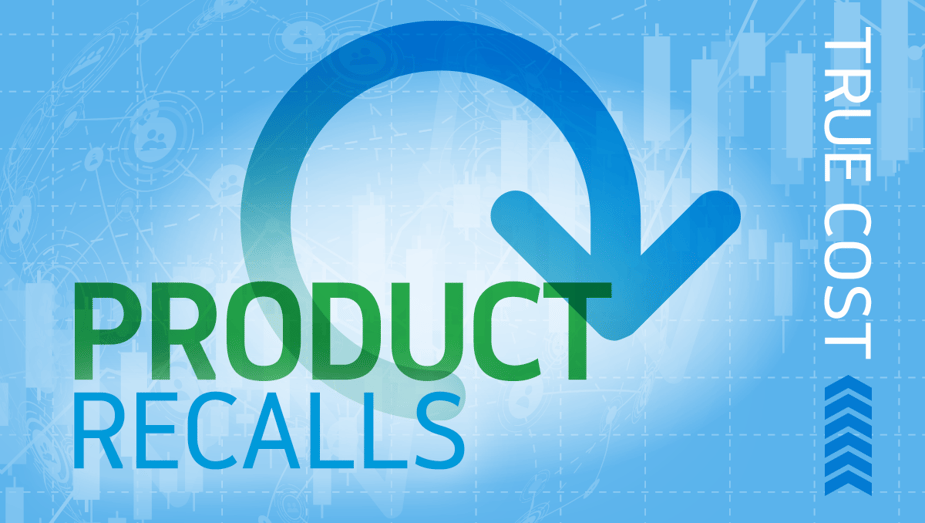
Food manufacturing and the true cost of product recalls
|
Quality Management
|
Product Lifecycle Management
|
Regulatory
Posted By:
Trace One
Editor note: This is the first post in our "True Cost" series where we dissect the true cost behind operational challenges facing process-based manufacturers and discuss how centralized technology solutions like a PLM system can help minimize these costs.
Recalls happen. The food industry is no exception.
The costs can be staggering, as a story in Food Manufacturing® notes:
“The most startling figures from the food industry are those that hint at the major financial burden of product recalls. According to the Grocery Manufacturers Association (GMA) and the Food Marketing Institute (FMI), the estimated average cost for a food recall is $10 million—and that is only the direct costs to the company, such as the retrieval and disposal of the tainted product. Factoring in the indirect costs, such as lawsuits, sales losses, and damaged reputation, drives that cost even higher.”
Why recalls happen
Food manufacturing supply chains are more complicated than ever.
Partners and intermediaries are spread across the globe. Product ingredients and packaging materials may pass through multiple hands before final product preparation occurs.
A Queen’s University analysis of food recalls in the USA, the UK, and Ireland found that 56% of recalls were from operational mistakes, including:
- Incorrect labelling
- Presence of an undeclared ingredient
- Contamination during the production process
And while salmonella, listeria, and e. coli played a role in product recalls, a “significant number of food safety alerts were actually due to food fraud and corruption by suppliers further down the supply chain.”
How to reduce the likelihood of fraud and recalls and avoid unnecessary costs
According to Queen’s University, the risks of fraudulent suppliers “highlights the need for food producers to invest in ensuring the traceability of their products back through the supply chain."
Trace One's Trace One Devex PLM Supplier Collaboration Portal empowers both suppliers and manufacturers to facilitate and simplify qualification, registration, and auditing to minimize data entry errors.
Successful food manufacturers deploy a range of techniques to keep customers safe and avoid the costs associated with recalls and litigation. These can include:
- Collaborating (as much as possible) only with known and trusted suppliers, vendors, and other partners
- Conducting regular supplier site visits and audits
- Working with an accredited laboratory to test product samples
- Creating detailed traceability plans
- Following detailed and strict hygiene and cleaning protocols
- Educating staff about food safety and fraud detection
- Using cutting edge software to give staff visibility into every step of the product lifecycle
The value of investing in a superior PLM solution
The increasing complexity of food manufacturing makes constant vigilance and awareness imperative. Food and beverage manufacturers need on-demand visibility into every aspect of ingredient sourcing and packaging in order to prevent problems from arising.
As a vice president for a major food manufacturer noted in a 2022 Trace One-commissioned study conducted by Forrester Consulting, “With Trace One Devex PLM, quality assurance managers can do a lot of checks and queries and do them a lot easier. Knowing their plant’s formulae and the materials in them helps them identify what they’re looking for.”
Trace One Devex PLM makes it easy for product managers and other staff to identify potential supplier risk factors and a host of other issues. Trace One Devex PLM gathers and centralizes data to harmonize information across the enterprise and prevent problems from emerging. Labels are accurate, ingredients can be tracked, and regulatory issues can be easily flagged across the product lifecycle.
A Director of Project Management at a food company queried in the same Forrester study added: “Now, R&D enters the recipe or formula directly into Trace One Devex PLM. The regulatory compliance team runs that particular formula through the regulatory parts of Trace One Devex PLM, and it comes back with all the right regulations and nutritional statements. By eliminating manual data entry, Trace One Devex PLM inherently reduced our recall risk.”
Interested in finding out how Trace One Devex PLM can help your company minimize the possibility of product recalls and their associated costs ? Schedule a demo today.
